University of Manchester
The University of Manchester (English The University of Manchester) is a British higher education institution located in Manchester in the north-west of England. With 40,485 students, it was the third largest university in the United Kingdom in the academic year 2019/2020; in terms of the number of employees (2019/2020: 11,210), it was the fifth largest. It is also one of the largest universities due to its nearly 500 degree programmes and an annual budget of the equivalent of almost one billion euros; it receives more applications from students than any other institution in the country. According to the Sunday Times, Manchester has an "impressive reputation that spans many subjects, particularly in the sciences, life sciences, engineering, business and the humanities". The university also includes Manchester Law School (founded in 1872), Manchester Medical School (founded in 1874) and Manchester Business School (founded in 1965), among others. The latter, along with its London counterpart, was the first business school to offer MBA courses in the UK and is ranked among the top 25 in the world by the Financial Times.
The University of Manchester was formed in 2004 by the merger of Victoria University of Manchester (founded in 1851 as Owens College, a Royal Chartered University since 1880) and the University of Manchester Institute of Science and Technology (UMIST) (founded in 1824), and is a member of the elite Russell Group. The University of Manchester was awarded the University of the Year 2006, following the Times Higher Education Supplement's University of the Year 2005 award. In the Academic Ranking of World Universities 2008, Manchester is ranked as the fifth best university in England and sixth best in Europe.
The university offers numerous courses of study. During its 200-year history, Manchester University has produced many pioneers and scientists, including 25 Nobel Prize winners, with groundbreaking innovations and discoveries: Among other things, Manchester was the site of the first splitting of an atomic nucleus, the development of one of the first computers, the Manchester Mark I, and the founding of neoclassical economic theory by William Stanley Jevons. Former professors include John Dalton (founder of modern chemistry), Bernard Lovell (pioneer of radio astronomy), Hans Geiger (inventor of the Geiger counter), Alan Turing (father of computer science and artificial intelligence), John Richard Hicks (economist and author of Welfare Theory), Ludwig Wittgenstein (philosopher), Paul Erdős (one of the most important mathematicians of the 20th century) and Anthony Burgess (famous English man of letters).
Manchester has been competing in numerous sports with the universities of Liverpool and Leeds since 1886 for the "Christie Cup", which is considered the oldest university comparison after the Oxford-Cambridge duels. The three universities, which date back to the 19th century, operated jointly as "Victoria University" in the early years, and this sporting comparison between these three northern English universities has survived to this day.
Alumni, famous lecturers and students
Nobel Laureate
- Joseph John Thomson (Physics 1906), for his research on the electrical conductivity of gases (discovered the electron).
- Ernest Rutherford (chemistry 1908), for his research on radioactive substances (split the atom)
- William Lawrence Bragg (Physics 1915, jointly with his father, William Henry Bragg), for his contributions to the study of crystal structures using X-rays.
- Niels Bohr (physics 1922), for his services to research into the structure of atoms and the radiation they emit.
- Archibald Vivian Hill (Medicine 1922), for his discoveries in the field of muscle heat production.
- Charles Thomson Rees Wilson (physics 1927), for the development of the Wilson cloud chamber named after him for the detection of ionizing radiation
- Arthur Harden (Chemistry 1929), for his research on sugar fermentation and the part enzymes play in this process.
- James Chadwick (Physics 1935), for the discovery of the neutron.
- Walter Norman Haworth (Chemistry 1937), for his research on carbohydrates and vitamin C.
- George de Hevesy (Chemistry 1943), for his work on isotopes.
- Robert Robinson (Chemistry 1947), for his studies on biologically important plant products especially alkaloids.
- Patrick Blackett (Physics 1948), for the further development of the application of Wilson's cloud chamber and the discoveries he made with it in the field of nuclear physics and cosmic rays.
- Sir John Cockcroft (Physics 1951), for his pioneering work in the field of nuclear transformation by artificially accelerated atomic particles.
- Alexander Robertus Todd (Chemistry 1957), for his fundamental work on the group of nucleotides and nucleotide coenzymes, their structural principle and chemical functioning.
- Melvin Calvin (Chemistry 1961), for his research on carbon dioxide assimilation in plants.
- Hans Bethe (Physics 1967), for his contribution to the theory of nuclear reactions.
- John Hicks (Economics 1974), for his pioneering work in General Equilibrium Theory and Welfare Theory.
- Nevill Francis Mott (Physics 1977), for fundamental theoretical achievements on electron structure in magnetic and disordered systems.
- Sir William Arthur Lewis (Economics 1979), for his pioneering work on economic progress in developing countries.
- John C. Polanyi (Chemistry 1986), for his contribution concerning the dynamics of elementary chemical processes.
- Michael Smith (Chemistry 1993), for his fundamental contributions to the establishment of oligonucleotide-based site-directed mutagenesis of deoxyribonucleic acid (DNA) and its development for protein studies.
- Joseph E. Stiglitz (Economics 2001), for his analyses of markets with asymmetric information. Former senior vice president and chief economist at the World Bank. He is currently a professor at Columbia University and directs the Brooks World Poverty Institute (BWPI) at the University of Manchester.
- John E. Sulston (Medicine 2002), for his research into the genetic regulation of organ development and programmed cell death. From 2007, Sir Sulston will teach in the Faculty of Life Sciences in Manchester.
- Andre Geim and Konstantin Novoselov (Physics 2010), for their fundamental work on graphene, a modification of carbon.
Politicians
- Margaret Beckett, Foreign Secretary of the United Kingdom
- Joseph Borġ, politician from Malta and EU Commissioner for Fisheries and Maritime Affairs
- Ólafur Ragnar Grímsson, President of Iceland
- Teo Chee Hean, Minister of Defence of Singapore
- Jamaluddin Jarjis, Minister of Science of Malaysia
- Kevin G. Lynch, "Clerk of the Privy Council and Secretary to the Cabinet" in Canada
- Said Musa, Prime Minister of Belize
- George Maxwell Richards, President of Trinidad and Tobago
- Christopher Tufton, Minister of Agriculture and Fisheries of Jamaica
- Chaim Weizmann, first President of Israel
- Atifete Jahjaga, President of Kosovo.
Economy
- Richard Anao, Chairman of the Nigerian Accounting Standards Board
- Don Cruickshank, Chairman of SMG plc and former Chief Executive of the London Stock Exchange
- Andy Duncan, CEO of Channel 4
- Keith Edelman, Managing Director of Arsenal FC
- Reinhard Goerdeler, Chairman of KPMG
- Rijkman Groenink, CEO of ABN AMRO
- Robert H. Herz, Chief Executive of the US Financial Accounting Standards Board (FASB)
- William Stanley Jevons, national economist
- Sir Terry Leahy, CEO of Tesco, England's largest and most successful supermarket chain.
- Michael D. Parker, CEO of British Nuclear Fuels
- Brian Quinn, former chief executive of the Bank of England and chairman of Celtic Glasgow
- Paul Skinner, CEO of Rio Tinto Group
- Vijit Supinit, Chairman of the Stock Exchange of Thailand
- Andreas Vranas, Vice Governor of the National Bank of Greece
Other
- Samuel Alexander, philosopher
- Teresa K. Attwood, bioinformatician and biocurator
- Robert Bolt, two-time Oscar winner and three-time Golden Globe winner, wrote the screenplays for Lawrence of Arabia and Doctor Zhivago
- Arthur Whitten Brown, along with pilot John Alcock, was the navigator of the first successful non-stop flight across the Atlantic Ocean
- John Dalton, chemist and naturalist, founder of modern chemistry
- Norman Foster, famous and multiple award-winning architect (among others for the work on the German Reichstag)
- Max Gluckman, Rhodes Scholar and noted anthropologist, founded the Manchester School of Anthropology
- Irene Khan, Director of Amnesty International
- Horace Lamb, mathematician
- Sir John Maddox, editor of the scientific journal Nature for 22 years
- Lewis Namier, renowned historian
- Jacob Plange-Rhule, Ghanaian physician
- Osborne Reynolds, engineer
- Henry Enfield Roscoe, chemist
- Sana Salous, Palestinian engineer
- Carl Schorlemmer, German chemist
- Arthur Schuster, naturalist and mathematician
- The Hon. Mr. Justice Peter Smith, Judge
- Alan J. P. Taylor, renowned historian
- Ludwig Wittgenstein, Austrian philosopher
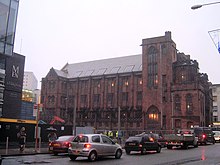
John Ryland's Library at Deansgate
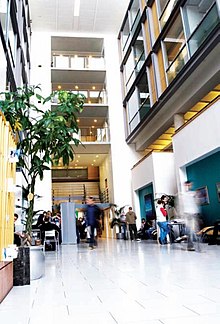
Atrium of the Manchester Business School (MBS) East building
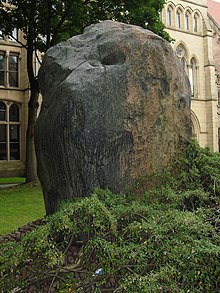
Foundling on the university campus
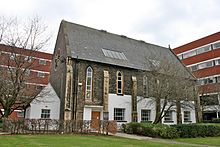
The Stephen Joseph Studio or German Protestant Church
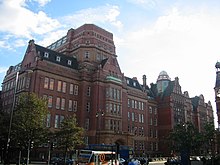
Main building of the City-Campus (former UMIST Campus)
Student figures
Of the 40,485 students in the 2019/2020 academic year, 22,350 were female (55.2%) and 18,135 were male (44.8%). 23,515 students were from England, 325 from Scotland, 855 from Wales, 385 from Northern Ireland, 3,060 from the EU and 12,275 from outside the EU. 15,335 (37.9%) were from outside the UK. 26,630 of the students (65.8%) were pursuing their first degree, so they were undergraduates. 13,855 (34.2%) were working towards a further degree, they were postgraduates. 3,860 of the postgraduates were working in research, which is usually in the context of a doctoral thesis.
Search within the encyclopedia